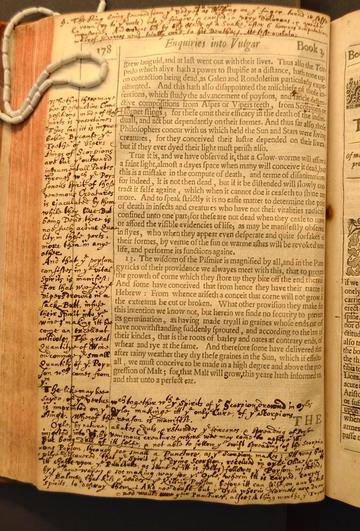Series Convenors: Dr Alex Aylward, Professor Erica Charters, Professor Mark Harrison, Dr Catherine M Jackson, Dr Sloan Mahone

Thomas Browne, Pseudodoxia Epidemica (London, 1646), with annotations by Christopher Wren
Seminars in the History of Science, Medicine, and Technology
Dr Alice Leonard (University of Coventry)
Correcting readers in seventeenth-century natural philosophy
This paper focuses on the attendant risks and uses of reading error in the early modern period. Thomas Browne’s highly popular Pseudodoxia Epidemica (1646) is an encyclopaedia of error, covering a huge diversity of subjects, from mineral and magnetic worlds, plants and animals, to pictures, biblical, mythical and classical worlds. Yet in the context of the development of the new methods of natural philosophy that were claimed to deliver truth, Browne is an imperfect reader because he reads for error and risks its replication. Despite addressing a whole host of popular errors, individualised into short chapters, their correction into truth is most often an elusive end. Browne hesitates at the stage before correction, arguing that ‘there are many things to be taken in a soft and flexible sense, and not to be called unto the rigid test of reason.’ His wonder at these curious falsities ties his work to error, as a space he seems satisfied to inhabit. He is often unconcerned with detail or accuracy and miswrites certain things that would make imperfect readers of others. His work on error and his faulty methods make Pseudodoxia Epidemica, in turn, a magnet for correction. One reader, Christopher Wren (1589–1658), left an exceptional amount of annotation in his Pseudodoxia Epidemica (1646), now held at the Bodleian (O 2.26 Art. Seld). This paper focuses on these readerly marks to investigate both Browne’s tendency to dwell in the realm of error and the manuscript responses of early modern readers to his small slips and trips, and his larger conceptual claims.